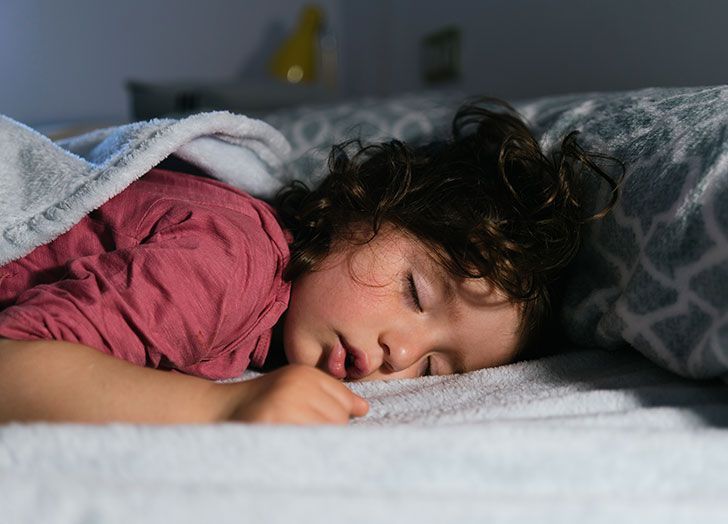

Is it just us, or do children only spike fevers on Friday evenings, riiight after the pediatrician’s office has closed for the week? Regardless, dealing with your child’s fever can be harrowing stuff, whether she’s seven months old or seven years old. And it’s extra stressful when it’s time for bed, and you’re not sure whether to let her sleep it off…or phone the answering service and wait for a call-back.
So, should you let your child sleep with a fever? Probably, says Dr. Sara Kopple of Westmed Medical Group in New Rochelle, New York. But first and foremost, you need to understand the severity of the fever and make sure you’re taking steps to properly manage it.
Let’s take a closer look.
What Constitutes a Fever?
“I think this is very confusing for parents,” says Dr. Kopple. “100.4 is my golden number,” she advises while admitting that a child with a fever of 100.3 is still a cause for concern, depending on age. Bottom line: “I generally am not concerned when a parent tells me their kid has a 99-range temperature—that is still considered normal.”
Ok, So What’s the Best Way to Take a Child’s Temperature?
“There are so many different types of thermometers on the market, even just getting a data point is confusing,” Dr. Kopple admits. She advises rectal thermometers for infants, and until they can no longer tolerate them. For toddlers, she likes temporal (forehead) or tympanic (ear) scanners because of their practicality. “They may not be as accurate, but you can actually get some good information.” For older kids, she recommends under the tongue but says that if you have trouble getting your child to cooperate, temporal, tympanic or axillary (armpit) temperatures also work just fine.
When Should I Call the Pediatrician About a Fever?
Dr. Kopple is clear that this really depends on your child’s age and how they appear to you, as their parent. In other words, it’s about more than just a number on a thermometer. “For newborns (usually three months and under) anything over 100.4 requires a call to the pediatrician, and for one to two months and under, an automatic trip to the hospital is necessary. As kids get a little older, any fever does not require an immediate phone call to the pediatrician if the child is otherwise active, well appearing, well hydrated and without other concerning signs and symptoms. If the child is ill-appearing, even a low fever is concerning. But a well-appearing child with a high fever is less concerning, in general.”
How Should I Manage My Child’s Fever?
The goal of fever reducers, like Children’s Acetaminophen (Tylenol) and Ibuprofen (Motrin), is really about reducing your kiddo’s distress and increasing their comfort.
“The fever itself is not dangerous, it is the body’s response to an infection, and the infection is generally what has the potential for being dangerous.” Still, as any parent knows, high fevers can make kids miserable, and Dr. Kopple says it’s perfectly fine to treat such fevers in order to improve comfort. “I find a lot of parents and providers are very nervous about bringing down the fever as quickly as possible.” But if it’s a question of comfort, she says, it’s absolutely fine to turn to the medicine cabinet. Just remember: “A fever alone in an otherwise well appearing child is OK. The adverse effects that parents associate with fevers—things like seizures—are really more related to the underlying illness or infection than the fever itself.”
As for dosage, Tylenol can be given every four hours, and Motrin every six. And while some providers recommend alternating between the two every three hours, others think it can increase the risk of medication errors. “I also prefer temperatures to be taken prior to medication administration to make sure there is still indeed a fever,” says Dr. Kopple.
What About Nighttime? Should I let My Child Sleep with a Fever?
Dr. Kopple is clear: While scary and sleep-depriving for you, middle-of-the-night fevers aren’t any different from ones that come on during the day. Again, “the fever is not necessarily the enemy, it’s the underlying process.” Age and medical history, of course, come into play, but “unless your child is a newborn, or has underlying medical conditions, it is OK for them to sleep with a fever,” she maintains. Still, if your kiddo is fighting a fever at bedtime, there are logical things you can do, like administer medicine (per the above times and dosages), adjust the room temperature and encourage them to stay hydrated.
So, If I Sneak into My Child’s Room and Notice A Hot Forehead, I Shouldn’t Wake Them Up?
Probably not! Says Kopple: “Again, if they seemed very ill appearing, it is a different story, but a middle-of-the-night fever in an otherwise healthy child, does not require them to be woken up in the night and brought into urgent care or ER. The rest may actually be more important to their healing.”
RELATED: I’m a Pediatrician, And Here’s Why I Support In-Office Well Visits, Even During a Pandemic